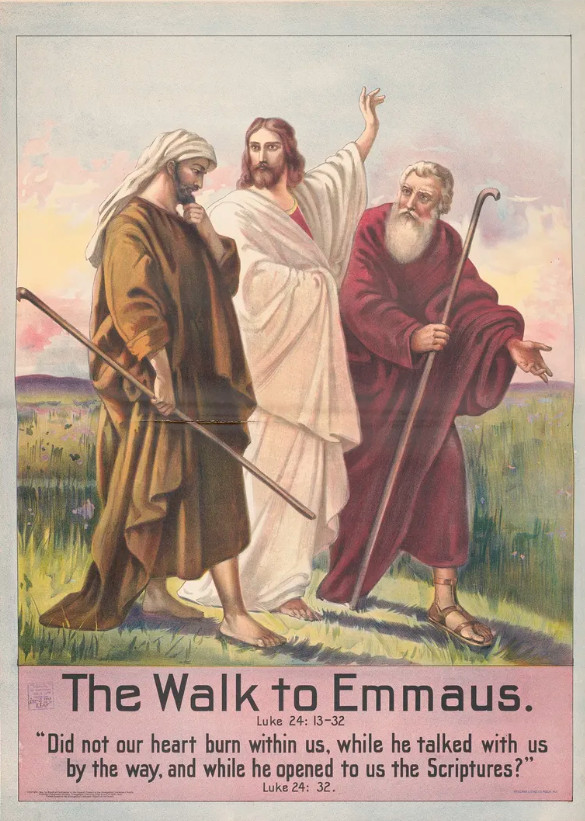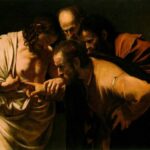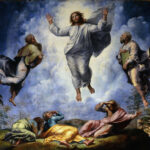The credibility of the Gospel, again.
Third Sunday of Easter (Year A)

Here’s our famous episode of the disciples going to Emmaus… Needless to say, modern scholars – in general – consider it a fabrication. And yet… Once again there are stylistic details that tell me otherwise; this isn’t how stories are invented, and here’s at least a couple of reasons that easily came to my puny little mind.
1. The trope of not recognizing Jesus, again! At least at first glance (but in this case they spent a lot of time with him before getting it!).
This is how a legitimate doubt about a mistaken identity makes its way: allegedly, these unbalanced people saw, or misremembered seeing, exactly what they desired to see. They met a good rabbi with whom they shared part of their journey; in retrospect they told themselves: it was him! Him!
First of all this story demonstrates the sincerity of those who retell the episode, and the rigor of those who, while putting it on paper, can only report the testimony as it is, without omitting embarrassing details!
I may anticipate the objection: “Achshually, not recognizing him immediately has a precise symbolic (narrative, what-have-you) reason”…
Baloney! There are many possible ways to communicate, and to obtain a desired effect in the readers: you don’t really need to employ such a suspicious plot element: if it’s present, it means that whoever wrote it was motivated to tell the truth.
Some proposed Tobit 5,4, where Tobit meets the angel Raphael and does not recognize him, as a narrative template on which this episode would have been modeled. Similarly in Genesis 18 Abraham and Sarah are visited by God in the form of three messengers, who appear as men and are subsequently called angels, but initially Abraham takes them as strangers seeking hospitality.
Who could really believe that it makes sense to invent such a story, starring the risen Jesus, just to rehash a familiar narrative pattern, in which someone coming from the supernatural world isn’t immediately recognized?
A stylistic trope? That’s such a minimal, insignificant “gain”, compared with what’s at stake. The Christian tradition lives on a completely different level. Using narrative paths that reek of mythology makes no sense when you want to bear witness to a concrete truth while a strong opposition from knowledgeable adversaries is present.
Unless this case of veiled identity, which is indeed somewhat recurring, has a different, intrinsic reason: not arising from a narrative scheme.
2. This is perhaps the most important episode among the encounters with the Risen Lord, as presented (Jesus really does spend a lot of time with those disciples, considering the long walk and staying for supper); or at least one of the most significant and described in detail.
But it doesn’t involve the Apostles; just a couple of disciples (one of them is named, though: Cleopas, perhaps a relative of Jesus; the other disciple could even be a woman, his wife, “sister” of Mary; this too has been hypothesized, and sounds reasonable).
Consider the Gospel: a message sent to a community that soon became large and spread to distant locations. Forgive me if I don’t remember the source, but there’s a figure I think is relevant here to give an idea of what orders of magnitude we’re talking about when discussing time constraints for spreading ideas, since this is the ancient world, minimally connected from our point of view … Well, I read that a manuscript deemed valuable and deserving dissemination could have been distributed, after having made the necessary copies, in the space of a week or so, to the communities of all the largest port cities of the Mediterranean (a few more days for the westernmost ones)… Don’t underestimate sail ships! For this reason Paul could send letters to various urban communities. A lively cultural life, today we would call it international.
Therefore this isn’t about a closed community, where the mere mention of Cleopas evokes everyone’s personal memories. The typical listener saw here two complete strangers, yet presented as recipients of a remarkable privilege.
If there were no other reasons, beyond reporting the testimonies considered more significant and better attested, why choose such insignificant protagonists?
It’s important to notice that Luke is the author here: neither a direct witness nor one who speaks on behalf of an Apostle, but a chronicler. And I took the liberty of calling him that based on how he chose to position himself in the compilation of his Gospel right from the opening.
Luke the chronicler.
Indeed, see Lk 1, 1-3:
Since many have undertaken to compile a narrative of the events that have been fulfilled among us, just as those who were eyewitnesses from the beginning and ministers of the word have handed them down to us, I too have decided, after investigating everything accurately anew, to write it down in an orderly sequence…
He cares about the content, in fact the pieces of news, not so much about the protagonists. He follows his own personal path, chooses the accounts that he finds most convincing.
Authority and human respect aren’t swaying him; he’s giving more weight to stories that look the most solid in his estimation, based on setting, reliability of sources, contents.
I think this point is decisive for understanding the contrast between the reasonableness of a Gospel that convinced entire populations and the detached/sophisticated point of view of today’s scholars.
Luke will certainly use his own literary style, and then rearrange the material, including a chronological sequence meant to follow his personal narrative path, for example by compressing the action in time and space. But can we at least concur on the fact that we’re dealing with a clearly identifiable author, evidently oriented to show intellectual honesty? Can we agree that he took some liberties but wasn’t certainly a forger?!? When he tells us that he was investigating everything accurately anew, and he puts the emphasis on eyewitnesses, are you ready to admit that he isn’t subtly deceiving us, but he’s really saying that he’s interested in getting to the bottom of issues and clarifying every circumstance?
Then yes, he failed to actually clarify: that’s fine. The whole timeline of appearances after the Resurrection, considering all the NT sources, is confusing and difficult to reconcile. But as I already had occasion to point out, it’s a good sign: if you write fiction, everything fits together. If you collect testimonials, there’s always something that doesn’t add up.
What’s crucial is the criterion of embarrassment: things that you wouldn’t find in the page if one had cared more about the message than the truth (as in this case: the disciples that cannot recognize Jesus). This criterion can help us assess how far the presumed “manipulation” by the sacred authors went. Yes, the text can be adjusted to suit a narrative and preaching style, to emphasize some aspects while glossing over others, and not always using criteria that we would accept today (but consider: today’s journalists also take unthinkable liberties and manipulate the news!)…
But the reworking of the stories doesn’t include inventing from scratch. There’s never an intent to deceive, since one is bearing witness to a God who sees everything and in whose presence you will soon present yourself (perhaps dying prematurely as a martyr).
The writer is not, until proven otherwise, in the position of thinking “a miracle would fit perfectly at this point of the story, I’ll just put it there”.
Daring to criticize the critics
I tried to get a grasp of the arguments thrown around by assorted scholars against the historicity of today’s reading and, unsurprisingly, they’re all over the place.
There are those who think they have identified a portion of the verses as a separate entity, coming from a different source, i.e. a earlier, lost tradition; OTOH there are those who insist the entire story has the imprint of Luke’s style, even in the choice of words, and therefore the entire narration is a fruit of his mind, a product over which he has total control and can invent whatever he wants…
Truly arbitrary statements: with such a criterion one could deny the historicity of any document.
Then a parallelism is suggested with Acts 8, 28-39, where the Apostle Philip is sent by God, through an angel, on a deserted road where he comes across an Ethiopian eunuch returning from Jerusalem; through this encounter Philip will get the opportunity to explain him a passage from Isaiah that foretold Jesus, and from there convert and baptize him. They travel a little way together, he converts him, and in the end the Spirit kidnaps Philip, who disappears.
See here, they say: the same literary pattern. The meeting on the road, the guide figure who has the opportunity to explain the Scriptures, the conversion of his interlocutor, the miraculous disappearance of the guide figure.
After all, isn’t that of Paul on the road to Damascus another encounter/apparition on the road?
Hold your horses: that’s not a properly formed thought process.
There’s this recognizable theme of a meeting on the road, true.
But I’d ask the average skeptic, then: do you appreciate the story of Jesus entering a room while the doors are closed, to meet the Apostles? Do you believe that’s fictional too? No need for a reply…
As a consequence, for different but apparently serious reasons, both the accounts of Jesus appearing inside a house and on the road are considered unreliable. So where the heck was he supposed to appear, if I may? Rather say that you don’t want to believe he could be seen after the resurrection, because you don’t believe.
Critics would retort: but here it’s not just about this detail of appearing on the road, there’s a whole list of recurring elements…
Wait… if we put aside the setting, which is trivial, and the parts that on the contrary don’t appear in both stories, what’s left?
-The fact that they discussed scriptures as they were traveling by foot;
– the presence of someone who brings the Revelation and someone who receives it;
– we could assert that the culminating moment is a sacrament: in one case the Eucharist, in the other, Baptism;
– the one who brings the Revelation, the interpreter as those exegetes call him, or the guide figure as I indicated him, in the end suddenly disappears from view.
But here we’re about a group, the sect of the rabbi Jesus, specifically involved in itinerant preaching; especially after the crucifixion, when being seen in the synagogues could be viewed as unhygienic, they were spending most of their time either inside a house, or on the road, moving to a new place, where they were to reside for a while.
Long journeys on foot, moreover, were the norm for the whole population. Certainly they used to travel in small caravans if possible, to avoid brigands.
Don’t you agree they were certainly spending a lot of time walking and talking? And often about religious topics, given the times of messianic fervor (and if you were talking about politics, weren’t you also necessarily talking about religion)? To think of it, the fact that in both our parallel accounts Luke presents us with this scenario for a conversion (or unveiling), complete with scriptural interpretation, shouldn’t really mean anything special!
Indeed, these are trivial stories if seen from such perspective. Let’s concede that, having to retell stories that are somewhat similar, using his own peculiar style, Luke may have accentuated this similarity.
For example, in the case of the eunuch, Philip seems the source of a very specific vivid memory, focusing on the citation of a decisive passage from Isaiah (even though the discussion was probably longer, touching on a number of points). Instead, in the case of Jesus at Emmaus, a sort of mega-summary is alleged, in a hasty and simplistic way, with which Christ is said to have explained to those two disciples, once and for all, the references to him that were inserted in the OT, from Moses onward (!)… It’s way more realistic to imagine they received only a few explanations, and then in Luke’s account a triumphantly thorough scheme is projected, which would give, at least in perspective, the satisfaction of a completeness, of finally getting to clarity, as any new convert would have hoped, being often confused by so many counter-intuitive aspect of the Gospel, and by how Jesus often had a teaching, a saying that they found hard…
But that’s not the end of the world, can you appreciate the difference here? It should be recognized that Luke takes the discourse to extreme consequences, simplifying it, but that’s not a reason, for self-appointed astute readers, to decree that this situation isn’t believable: i.e. the mere fact that Jesus, when meeting his followers, can teach (!) and provide explanations!
Okay, the presence of a sacrament is instead a non-trivial element, carrying significance well beyond the narrative level (moreover, inconveniencing those who imagine the sacraments to be a much later invention). But why shouldn’t that have happened?
There’s nothing extraordinary about the fact that there are stories of conversion in the NT! And: the conversion of those outside the ekklesia necessarily involves Baptism; the disciples at Emmaus take that extra step instead through the Eucharist. Why should these ordinary and consequential facts not have happened? Why insist they should be the result of an arbitrary choice, to invent stories to chase a narrative cliché?
I’m sorry, I wouldn’t be in the position to challenge experts: for their knowledge and qualifications, if anything. As if ignorant people like me could give lessons to professors. But until proven otherwise, here I’d say prejudices are at play.
Finally, in the parallelism between Emmaus and the encounter with the Ethiopian, the supernatural element remains to be explained; which, however, to put things in order, could be conceived as an added, or “copied” element, in Philip’s case, and not vice versa. Jesus Christ disappearing after an apparition: in retrospect, that’s an obvious turn of events. At most we could have doubts (and I’m perplexed too) about the case of the “kidnapping” of Philip. But a doubt is on a whole different league from confidently declaring that certain accounts can’t be historical…
Philip could very well have felt an inspiration: to go to a certain place at a certain time, thus having the chance to meet the Ethiopian; in retrospect he may have interpreted that inner motion as the discreet suggestion of an angel, and why not? Easier to believe than an angel appearing to his very eyes; easier even than suggesting a choice, on the part of Luke, to add this angel calling as an arbitrary symbolic plot twist. To think of it, all three alternatives are technically possible; yet none of them can be the basis for questioning the veracity of the story behind the Gospel text.
Philip was “kidnapped”… or maybe that’s not the case? Let’s admit this without difficulty. But why assume that certainly never happened? Have we come to this? Modern critics that question an apparition of Jesus Christ as lacking credibility, just because on a different occasion an Apostle is also, allegedly, the subject of a miracle?
I may humbly suggest that a sort of allergy of the modern scholar to the supernatural is the real element at play here. Scholars that often aren’t excluding miracles on a personal level, as part of their private religious convictions, but when writing and teaching treat it as dangerous matter, something akin to a bar of radioactive material. Distancing themselves, convincing themselves that through a skeptical approach they’ll thus arrive at “scientific” results, which can be agreed upon both by believing and non-believing scholars…
And that’s not really how it works!
Other objections are even more far fetched, such as: if those two were his disciples, why, upon hearing of the news of their Master’s empty tomb, did they hastily return to Emmaus, instead of staying to investigate in Jerusalem?
These kinds of objections I can’t stomach.
How could you possibly expect, after more than 1950 years, to be able to have a say in the sequence of trips made, on a specific day, by two people you basically know nothing about?
First of all we have a legitimate doubt even on the actual temporal location of the episode.
Were they too heartbroken, or lacking faith in the resurrection they had already heard news of? Maybe, and assuming that’s the case, so?
It’s possible; human beings experience internal conflicts; the third-hand account of their state of mind won’t do justice to what moved them. Logical schemes cannot be applied to their reactions, as reported by others, to try to invalidate them. Just as we don’t know what factors moved them to depart (for example pressing work or family issues) regardless of a confusing piece of news they tended not to believe. It’s ridiculous.
The exegete tends to claim to be able to judge and reach conclusions on subjects and documents of which little is known. That’s how are formed half-certainties with the weight of a granite slab, but resting on thin paper feet.
All things considered I’d suggest to go back to the most significant element, which is the human heart. Scholars often underline how the mentality of those times was radically different from ours, therefore people tended to carelessly believe in sketchy and fantastic stories. And obviously they’ll say the narrator chased stylistic models and was to give pre-packaged answers, he didn’t try to narrate the facts as they happened.
There is some truth in this, but we have once again to thank Paul’s opponents in the Agora, who sneered at the announcement of the Gospel.
People have always had a different approach to narratives where mythological gods were involved. A sort of suspension of disbelief was involved. They weren’t really convinced, not completely.
The novelty of Christ’s Gospel was precisely this “no, but we really mean what we’re saying” and this is why it generated strong, violent or enthusiastic reactions.
Nobody lifted a finger for the sacrifices to Zeus, but many were (and are) willing to do anything in the face of this Christian revolution. One reason is, even perhaps through some naive and simplistic literary scheme, Gospel testimonies required a more mature approach, inspiring love for the truth.
Problematic texts and doubts, yes. But those writings reflect an unprecedented concern: that of seeking the truth, collecting data with accuracy.
That wasn’t a primitive creative community, with multiple people being free to invent stories, to give physicality to an imaginary event, to an invisible resurrection that was only “felt in their hearts” !
We need to take the Gospels back!
The last piece
I originally ended the article here. And if you want you can stop right now, close the page and move on to something else.
However, for the sake of completeness, we could analyze the testimony itself, and this requires some effort.
Ok, someone may assert: let’s say you almost convinced me; let’s assume that these witnesses were sincere, and that whoever collected the stories wanted to keep them intact, applying only unimportant editorial modifications.
But can’t they have seen something else? Isn’t the fact that they met him that is doubtful, even if retold with sincerity? They see someone who doesn’t look like him. Then he disappears, and only then do they proclaim: it was him!
Certainly they may have been influenced by the emotional climate of those days. They didn’t know what they really saw.
That’s why I always like to talk about a sort of puzzle metaphor. There is a chain of non-trivial consequences that derives from any choice based on more or less reasonable stances we take on what may be true in our estimation.
The shape of this puzzle piece is complex: apparently it has a different use if put down in the direction of its content or in the direction of the credibility of the source.
If you’re familiar with the 9/11 conspiracy theorists, you’ll know that every credible testimony on the events and every scientific-engineering confirmation can be met with a series of objections among the most imaginative, far-fetched, contradictory and disconnected from each other. Quite a different topic, sure; and the level of rigor and credibility of the critics here is remarkably different, but the problem remains: those who don’t want to believe the “official version” (at all costs) need not look for an alternative reconstruction; it’s enough for them to pile up the highest possible number of arguments against, even if perhaps intrinsically weak or impossible to reconcile with each other.
In this case, for example, we have two problems that almost contradict each other:
if A. this mysterious guy were just a traveler who happened to be good at discussing theology, it wouldn’t be possible to explain his disappearing from their sight.
If B. he were a vision of Jesus, a projection of the imagination, which then disappears and they return to reality, why so many incongruous details, such as not recognizing him?
I don’t know if I can convey this subtlety well enough: from the internal point of view of the witness, the two weak spots of the story don’t go well together: they point to different directions. From the exterior point of view instead, seen from the perspective of a skeptic that one would in theory try to convince, the problems are two, and they reinforce each other, because they highlight two separate ways in which the whole story could lack any substance. And this interlocutor was already primed for the opportunity to say no.
Here’s the trick: A and B put together are giving skeptics a field day, therefore they testify to a fundamental credibility, of people motivated to accurately report even what exposes to doubts and hinders preaching. But once you consider this an acquired result, they don’t undermine credibility, quite the contrary.
If Jesus suddenly disappears, the interpretation based on the mistaken identity becomes an impossibility. The setting is precise and does not allow for misunderstandings: he doesn’t get out of their sight while walking through a crowd or something. They’re just two persons at home, indoors, having dinner with a guest. Two witnesses that we now consider credible, who immediately run to Jerusalem to testify: he just disappeared! It’s not like people may become so easily convinced to have seen Jesus in a stranger, especially by adding a miraculous disappearance that never took place.
And let’s not forget that this story seems to have been selected, given what I said above about the nature of the protagonists, according to criteria not known to us, but which probably involve their reliability as witnesses.
The alternative remains: they were hallucinating. So yes: in this case the disappearance poses no problems. But here we’d have to consider a hallucination that lasts for hours; through a long journey, a dinner… Yes, it’s true they weren’t modern men, they were no rationalists. But they weren’t the projection of the opposite prejudice either: the idea that in the old times people ran after fairy tales.
Humans are always humans. People don’t throw themselves so easily, body and soul, into an imaginary story. And hallucinations are not such a common event to come across, so complex and articulated, and above all somehow shared among several people (!).
So, to maintain this line of criticism we would have to invent a very complicated plot, in which, for example, this Cleopas has visions, thinks he sees stuff; in the vision he does not recognize Jesus, which is strange. Furthermore, he has very tight control over the other disciple, let’s say it was her wife: he convinces her, psychologically manipulating her, to believe or pretend to have seen the same things he says he saw.
And here comes the difficult part: they should bear such a testimony to the community and pass for a earnest, reliable, non-suspicious couple. Despite a double pathological mental profile. Maintaining credibility over time, so much so as to emerge, as a testimony, over many others.
This sort of triumph of gullibility is taken for granted by your average skeptic who despises believers and considers them lacking in critical thinking, but it’s a hard sell for anyone understanding the complexity of relationships within a group.
Well, there may be an alternative fantastic plot: the testimony of the two perhaps initially was only about “recognizing” Jesus in the random wayfarer they met; in retrospect someone, probably Luke, adds the detail of the sudden disappearance of Jesus. The whole story thus becomes incidentally more credible and difficult to decipher.
This plot takes for granted, however, that 1. the first account, devoid of any factual supernatural elements, gained in credibility with little reason to do so. When questioned, they could only say that they believed they recognized Jesus, in retrospect, in a man whom they did not even ask who he was (!), in whose facial features they had NOT seen the Master, and who went away normally!
And that 2. a version of their inconclusive story, which was now silent on how the stranger had left, was taken up by Luke, carelessly adding the decisive detail of the miraculous disappearance.
Sure, it’s theoretically possible. But it’s a heck of a convoluted plot. A series of possible events, lined up one after the other to satisfy the condition: to explain what has come down to us, in a necessarily alternative way. Without evidence.
Countless stories could be invented like that.
We need a sense of proportion…
It is one thing to recognize the difficulty in a reconstruction, and doubt is always a tangible presence for the wise Christian believer: who’s taking accounts seriously, not gullibly. And consider the Hidden God we believe in: God doesn’t force you to believe with irresistible proofs, but leaves room for our freedom.
It’s another thing entirely to push doubt to the extreme and decide that only materialistic or demystifying interpretations can be considered worthy of approval. Top authorities from a caste of experts, drawing a picture in which the only version of history to look at with pity would be that of believers.
If I have to leave with a conclusion, I would say that the most important thing to note here is this: in my small way, I may have asked too much from my syllogisms, and failed to consider many details known to insiders.
But remember that I am not trying to state my truth, my version, or a higher claim, regarding those events.
I’m just defending the version that made sense to those that initially received the testimonies, from ex post facto reconstructions that appear too heavily bent on biased skepticism.
I’m not saying I know they’re not right. Only, it’s evident that these experts pretend to know too much.
At least, let me bring the ball back to the center court: to doubt is fine and even required; to try and demolish with such an attitude, is not acceptable.










































